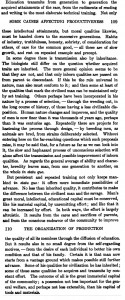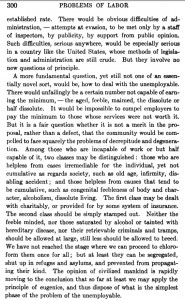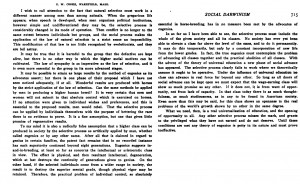Alexis Carrel, Nobel Prize Winner. Man the Unknown, 1939. [Source] A choice must be made among the multitude of civilized human beings. We have mentioned that natural selection has not played its part for a long while. That many inferior individuals have been conserved through the efforts of hygiene and medicine. But we cannot prevent …
Category: breeders
Karl Pearson on ‘race-suicide’ (1907)
Quoted by Collin Wells in 1907: As Karl Pearson has recently said: The great problem is whether limitation has not begun at the wrong end. If a nation is to be strong, there must be wastage; the reckless and diseased must not be in a condition to multiply like the strong and able. At present …
Foster Kennedy: Euthanasia for “Nature’s Mistakes” up to the age of 5
Kennedy’s address at the 97th annual meeting of the American Psychiatric Association in 1941 encapsulates well how the acceptance of evolution and utilitarian thinking are tied into arguments for eugenics (and euthanasia), which is ironic, of course, since many advocates for euthanasia deny such connections and modern proponents of evolution become apoplectic at the insinuation …
Charles Galton Darwin: “Unconscious Selection”
From Charles Galton Darwin’s The Next One Million Years: [civilization has the tendency] to eliminate its ablest people. This has happened in the past, and is certainly happening now, and if it is always to happen, it signifies a recurrent degeneration of all civilizations, only to be renewed by the incursion of barbarians who have …
Taussig: The breeding of men, eugenics, and progress. 1911
SOURCE: Frank Taussig, Principles of Economics, Volume II, 1911. Pages 233-237. This movement is steadily extending, and is gradually affecting not only those who are usually thought of as being in a more special sense “native born,” but the descendants of the immigrants as well. The influence of free institutions and of free opportunities is …
The Minimum Wage As Means to Exterminate Defectives: Taussig, 1911
SOURCE: Frank Taussig, Principles of Economics, Volume II, 1911. Pages 299-300. As with legislation on hours, factory conditions, and the like, a compulsory minimum wages rate might serve simply to regulate the plane of competition. All employers would be affected alike; no one could undersell the others by cutting below the established rate. There would …
Eugenics as a Religion and Social Darwinism, Collin Wells
Source: Dr. Collin Wells, “Social Darwinism” a paper presented in 1907, found in The American Journal of Sociology, pages 706-709 Finally, what is the evolutionary value of certain ideals? Let us take individualism, the ideal of democracy, which has tacitly figured in many of the phenomena to which I have already referred. Let us go …
Universal Education a Pre-Requisite for Effective Eugenics Policies
Source: G.W. Cooke, discussing ‘Social Darwinism’ in American Journal of Sociology 12 (March 1907), 714-715. Below the image is OCR scanned text. If anyone would like to send a cleaned edition, that would be greatly appreciated. I wish to call attention to the fact that natural selection must work in a different manner among men …
E.A. Ross and the Difference in Races
Source: E.A. Ross, discussing ‘Social Darwinism’ in American Journal of Sociology 12 (March 1907), 715. Strongly attracted as I am by the hopeful and noble views that have been expressed, I cannot but feel that Dr. Wells’s is right. The theory that races are virtually equal in capacity leads to such monumental follies as lining …




Recent Comments